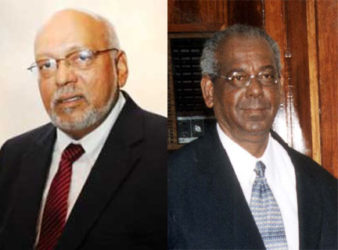February 26,2017
The PPP unanimously decided in about 1994-5 to propose to the Select Committee on Constitutional Reform established by the Sixth Parliament (1992-97) that a president should serve only two terms. I led the delegation, which included former President Donald Ramotar, and presented the PPP’s position.

The PPP presented the same position to the Constitutional Reform Commission (1999-2000), which I chaired. Its delegation was led by former President Donald Ramotar, then General Secretary. The two-term presidential limit, supported by the PNCR, was adopted by the Constitution Reform Commission and formed part of its recommendations. Article 90(3) of the Constitution was duly amended by Act No. 17 of 2001, unanimously passed in the National Assembly, to limit the presidential terms to two.
The Guyana Constitution can be amended in three ways. Some provisions require a simple majority, some a two-third majority and others, a referendum. An amendment to Article 90 requires a two-third majority.
In the Richardson Case in the High Court, (the ‘Third Term Case’) which was upheld by the Court of Appeal, (the written decision is not yet available), Chang CJ held that limiting the presidential term to two was not an amendment to Article 90 but a new provision of the Constitution. On that basis, Act No. 17 of 2001, which limited the right of the electorate, in whom democratic sovereignty lies, to choose who it wants to be its president, could not be passed merely by a two-third majority but required a referendum.
These legal matters relating to presidential term limits are of great jurisprudential interest and constitutional importance. But at the end of the day, if the CCJ upholds the decision of the Court of Appeal, in political terms, the issue becomes only of expensive inconvenience, namely, the holding of a referendum.
Since both the PPP and the PNC support a two-term presidential limit, and former President Bharrat Jagdeo has repeatedly said that he also does and has no interest in a third term, the outcome of a referendum would be a mere formality. It would be expected, of course, that the leadership of the PPP would resist internal calls, if made by orchestration or otherwise, to change its long-standing position in support of term limits.
In an article published on September 3, 2009, entitled ‘Term limits,’ I made a brief review as follows: “Most countries in Latin America impose term limits…Most countries in the Westminster system and in Europe, do not have term limits, but with a few exceptions, like Singapore and Malaysia, governments rotate between two main parties or coalitions…
“In recent years many countries, particularly in Africa, imposed term limits. Since the early 1990s 18 African presidents completed two terms in office. Eight retired while ten sought amendments to their constitutions to remain in office. Seven were successful. (Daniel Vencovsky: Presidential Term Limits in Africa, January 20, 2008). It is fair to conclude that the trend towards term limits for presidents is strong. It is perhaps irreversible in Latin America but not yet so in Africa although the unmistakable tendency is in that direction. For prime ministers in this region and elsewhere there is no such trend, nor demand.”
The mixed success of, but unmistakable trend towards, term limits, is demonstrated by the situation in Congo where President Kabila is attempting every ruse to hold on to power, but is being pressured to uphold the two term limit. This situation is yet to be resolved. On the other hand, giving a nod to reality, former British Prime Minister, David Cameron, undertook to serve only two terms. In the Caribbean, there are frequent changes of governments but no term limits. The political health of Guyana, with its past history and unwholesome struggle for ethnic dominance, needs at best a national unity government comprising both the main political parties, or at least, regularly rotating governments led by one or the other main parties. However, with immediate past governments in power for 28 and 23 years respectively, such an electoral outcome is not certain. Presidential term limits is, therefore, an absolute minimum.
T The unlimited right to hold the position of head of government will inevitably lead to authoritarianism and corruption. Wise leaders like Cheddi Jagan, Janet Jagan and Desmond Hoyte saw this and that is why they supported term limits. Both main political parties should, therefore, have no difficulty in supporting a referendum. For those who might be tempted, if the CCJ upholds the Court of Appeal, the Bolivia experience is salutary. The electorate recently rejected the attempt by the popular President Evo Morales of Bolivia to secure a constitutional amendment by way of a referendum to run for a third term.
If the Attorney General does not succeed in the CCJ, the government will have to do what it needs to – hold a referendum. The PPP would have no reason not to support it. A convenient time would be for a referendum to piggyback on local government elections in 2019 to save costs. The government may wish to complete the constitutional reform process by then so that if a referendum is required on other issues, it can be held at the same time.

